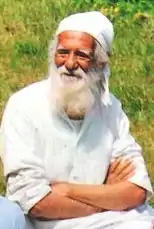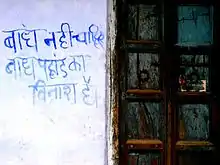Sunderlal Bahuguna
Sunderlal Bahuguna (born 9 January 1927)[2] is an Indian noted Garhwali environmentalist and Chipko movement leader. The idea of Chipko movement was of his wife and the action was taken by him. For years he has been fighting for the preservation of forests in the Himalayas, first as a member of the Chipko movement in the 1970s, and later spearheaded the Anti-Tehri Dam movement starting 1980s, to early 2004.[3] He was one of the early environmentalists of India,[4] and later he and people associated with the Chipko movement started taking up environmental issues, like against large dams.
Sunderlal Bahuguna | |
|---|---|
 | |
| Born | 9 January 1927 |
| Occupation | activist, Gandhian, environmentalist |
Early life
Sunderlal Bahuguna was born in of village Maroda near Tehri, Uttarakhand on 9 January 1927. He claimed in a function arranged at Kolkata, that his ancestors bearing surname Bandyopadhyaya, migrated from Bengal to Tehri, 800 years ago.[5] Early on, he fought against untouchability and later started organising hill women in his anti-liquor drive from 1965 to 1970.[6] He started social activities at the age of thirteen, under the guidance of Shri Dev Suman, who was a nationalist spreading message of non-violence[7] and he was with the Congress party of Uttar Pradesh (India) at the time of Independence.[8] Bahuguna also mobilised people against colonial rule before 1947.[9] He adopted Gandhian principles in his life and married his wife Vimla with the condition that they would live among rural people and establish ashram in village.[9] Inspired by Gandhi, he walked through Himalayan forests and hills, covering more than 4,700 kilometres on foot and observed the damage done by mega developmental projects on the fragile eco-system of the Himalayas and subsequent degradation of social life in villages.[9]
Chipko movement
Chipko movement was started on 26 March 1974 spontaneously in Uttar Pradesh, in an effort to save areas of trees and forests from cutting by forest contractors.[10] In Hindi, "Chipko" literally means "hug" and people started hugging and holding onto trees when it was being cut. Chipko movement. One of Sunderlal Bahuguna's notable contributions to that cause, and to environmentalism in general, was his creation of the Chipko's slogan "Ecology is permanent economy." Sunderlal Bahuguna helped bring the movement to prominence through about 5,000-kilometer trans-Himalaya march[9] undertaken from 1981 to 1983, travelling from village to village, gathering support for the movement. He had an appointment with the then Indian Prime Minister Indira Gandhi and that meeting is credited with resulting in Mrs. Gandhi's subsequent 15-year ban on cutting of green trees in 1980.[3] He was also closely associated with Gaura Devi, one of the pioneers of the movement.
Anti Tehri Dam protests

He has remained behind the anti-Tehri Dam protests for decades, he used the Satyagraha methods, and repeatedly went on hunger strikes at the banks of Bhagirathi as a mark of his protest.[11] In 1995, he called off a 45-day-long fast following an assurance from the then Prime Minister P.V. Narasimha Rao of the appointment of a review committee on the ecological impacts of the dam. Thereafter he went on another long fast which lasted for 74 days at Gandhi Samadhi, Raj Ghat,[12] during the tenure of Prime Minister, H.D. Deve Gowda, who gave personal undertaking of project review. However, despite a court case which ran in the Supreme Court for over a decade, work resumed at the Tehri dam in 2001, following which he was arrested on 20 April 2001.
Eventually, the dam reservoir started filling up in 2004, and on 31 July 2004 he was finally evacuated to a new accommodation at Koti. Later he shifted to the capital city of Uttrakhand, Dehradun and is currently living there with his wife.[3]
Sunderlal Bahuguna has been a passionate defender of the Himalayan people, working for temperance, the plight of the hill people (especially working women). He has also struggled to defend India's rivers.[13][14]
Awards
- 1981: Padma Shri Award by government of India, but he refused it.[15]
- 1987: Right Livelihood Award (Chipko Movement)[10]
- 1986: Jamnalal Bajaj Award for constructive work.[16]
- 1989: Honorary Degree of Doctor of Social Sciences was conferred by IIT Roorkee
- 2009: Padma Vibhushan Award by government of India for environment conservation.[17][18]
Books
- India's Environment : Myth & Reality with Vandana Shiva, Medha Patkar[19]
- Environmental Crisis and Humans at Risk: Priorities for action with Rajiv K.Sinha[19]
- Bhu Prayog Men Buniyadi Parivartan Ki Or (Hindi)[19]
- Dharti Ki Pukar (Hindi)[19]
- James, George Alfred (2013). Ecology is Permanent Economy: The Activism and Environmentalism of Sunderlal Bahuguna. Albany: State University of New York.
References
- Bahugunabetterworldheroes.com.
- Sharma, Seema (10 January 2018). "Dams paving way for more calamities: Sunderlal Bahuguna". The Times of India. Retrieved 17 October 2018.
- Bahuguna, the sentinel of Himalayas by Harihar Swarup, The Tribune, 8 July 2007.
- Sunderlal Bahuguna, a pioneer of India's environmental movement... New York Times, 12 April 1992.
- Banerjee, Sudeshna (13 March 2011). "Bengali Bahuguna". The Telegraph, Calcutta. Retrieved 8 October 2012.
- Sunderlal Bahuguna Archived 27 December 2008 at the Wayback Machine culturopedia.com.
- Pallavi Takur, Vikas Arora, Sheetal Khanka (2010). Chipko Movement (1st ed.). New Delhi: Global Vision Pub. House. p. 131. ISBN 9788182202887.
- Shiva, Vandana (1990). Staying alive: women, ecology, and development. London: Zed Books. p. 70. ISBN 9780862328238.
- Goldsmith, Katherine. "A Gentle Warrior". Resurgence & Ecologist. Retrieved 8 October 2012.
- Chipko Archived 3 March 2016 at the Wayback Machine Right Livelihood Award Official website.
- Big Dam on Source of the Ganges Proceeds Despite Earthquake Fear New York Times, 18 September 1990.
- "If the Himalayas die, this country is nowhere" Archived 9 December 2006 at the Wayback Machine. An Interview with Sunderlal Bahuguna with Anuradha Dutt (1996 Rediff Article). Uttarakhand.prayaga.org. Retrieved on 1 May 2012.
- 'My fight is to save the Himalayas' Archived 26 September 2007 at the Wayback Machine Frontline, Volume 21 – Issue 17, 14– 27Aug 2004.
- Bahuguna Archived 9 December 2006 at the Wayback Machine uttarakhand.prayaga.org
- "Noted activist Sunderlal Bahuguna turns 90". Pioneer. 10 January 2017. Retrieved 21 October 2018.
- "Jamnalal Bajaj Awards Archive". Jamnalal Bajaj Foundation.
- "List of Padma awardees 2009". The Hindu. 26 January 2009. ISSN 0971-751X. Retrieved 12 February 2018.
- "Padma Vishushan awardees". Govt. of India Portal. Archived from the original on 27 April 2009. Retrieved 17 October 2018.
- "Sunderlal Bahuguna". flipkart. Retrieved 8 October 2012.